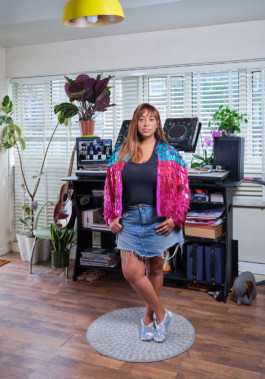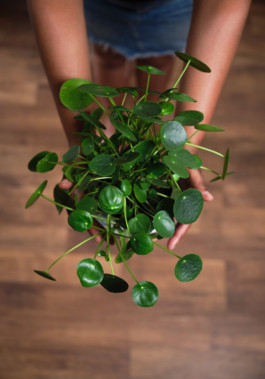Natalie: “I name my plants to encourage me to look after them better”


listen:
Photography: Amit Lennon
Audio Producer: Deborah Shorindé
Music: House Gospel Choir
read:
I name my plants, to help encourage me to look after them better. And I named them after people I love. My money plant is called Rebecca – that’s my younger sister.
There’s so many leaves, and there’s so many directions that they’re growing in. And I can’t control it. I can’t control which leaves are gonna flourish and which ones, like… it’s not like they’re all growing in the same way. It’s the same thing. And it’s the same unit. And it’s, completely together. As long as I do my bit, it stays together. They’re all on their own journeys. But to me, it kind of looks like the choir.
House Gospel Choir is a live music experience, where the spirituality of Church and the euphoria of the dance floor come together and just create something really epic for us all to enjoy.
My big thing is that we’re supposed to be together. I fully believe we’re supposed to come together and have communion and share space. And music is one of the best ways of doing that, of linking people together. Because you don’t have to be the same colour, you don’t have to have the same political beliefs. A song can talk to people from across all different divides.
It’s definitely an ambition - as is the whole House Gospel Choir project – to just link more people, and for more people to realise that we truly are one.
So the Zoom style videos we’ve been doing, we call them our re//choired videos. And re//choired is – it’s our version of a remix. It’s basically, rather than a remix, it’s a re//choiring of classic records, classic house records, classic gospel records that have moved us and is also required. Like, we need it in our lives: it’s a requirement to have joy and to sing.
The response to it has just been bonkers, like seeing people repost it and how many people like it, reading some of the comments about how much it is helping people stay positive and joyful. And you know, people started to rely on them. It got a bit like EastEnders or something, like every Sunday, like you’re guaranteed to get one. And we hadn’t planned to do them every week, because first of all, we didn’t think lockdown was going to be that long. We thought maybe we’ll do three. And 18 weeks later, we’ve done 18. So it’s like, yeah, it’s been a beautiful, beautiful challenge that has just kept us together, and also connected us with, like, parts of the world that we’ve never been to, and people we’ve never – maybe we’ll meet them one day – but it’s affecting people we’ve never met. And that in itself is just really really special.
Start of lockdown, I was really scared. I think I had massive like, fear and anxiety. And I felt weirdly responsible because we had so much work cancelled. And so many shows, which is like people’s livelihood. It’s their income. So I was really concerned about the impact it would have on everyone’s lives as individuals within the House Gospel Choir. It’s a lot of responsibility. And I think that’s one word that always comes back to me because I feel massively responsible for this thing I’ve brought into the world. And I know what a force for good it is.
There was, like, this sense of heaviness that potentially is, you know, just… just depression. And I felt like I was always trying to find a way to keep that heaviness off of me because it can be very debilitating.
Just stopping and having a nap or several naps back to back whilst eating Uber Eats, or whatever I fancied that day, and watching Real Housewives of Atlanta from the top to the bottom. They were all things I had to do as well because I found joy in being down. There’s been times where I’ve definitely given in and just used that heaviness like a blanket and just let it, like, keep me routed to the spot a bit. So I think – as much as there’s this depressing element to it, and this real scary element of it – there’s some weird kind of safety in there. That you can just stay in one place. And just be. And not have to try to do everything and be everything all the time.
My balcony plants if you have a look out there, they look really tragic. They’re really sad, they’re really scorched. They’re not getting on very well in life. But the ones inside are flourishing. And I think that’s like a wicked analogy for how life has been during lockdown. Like, you have to take care of what’s inside, take care of what you can control, nurture and nourish the things that you have access to. And don’t worry about what’s outside quite so much. I’m happy because I’ve got this in here as well.
And lockdown has been that, it’s just been like a reminder to look after ourselves and each other, like in a really intrinsic kind of internal way rather than always being concerned with what’s happening outside, which is how we usually are, We’ve got various aged people in our choir. We’ve got various races, various sexual orientations, different beliefs, different religious beliefs, some people on the cusp of atheism. Yeah, it’s some real, real diverse characters. No one is the same. No two people are the same in this choir. And yet somehow we work well together.
You have to work together. And just really understand your place in that tapestry. Because I see my place – like, as much as I am leading this thing, and I feel massively responsible – I am one person doing one thing over here. And there’s all these amazing people in the choir, from my manager, to all the singers, t our tour manager, to the people at the record label, our sound engineer. You know, all these people working together to make something happen is why House Gospel Choir is here. So, just as a way of working, everyone could just benefit from just finding a way to work collectively rather than either sucking energy from other people or just thinking ‘I’ve got this and I’m just gonna go over here and do it by myself’.
It’s like - individualism’s cool and everything – but we’re not going to get any further unless we work together.
An Empathy Museum project made with the support of NHS England and NHS Improvement, The Health Foundation, and Arts Council England